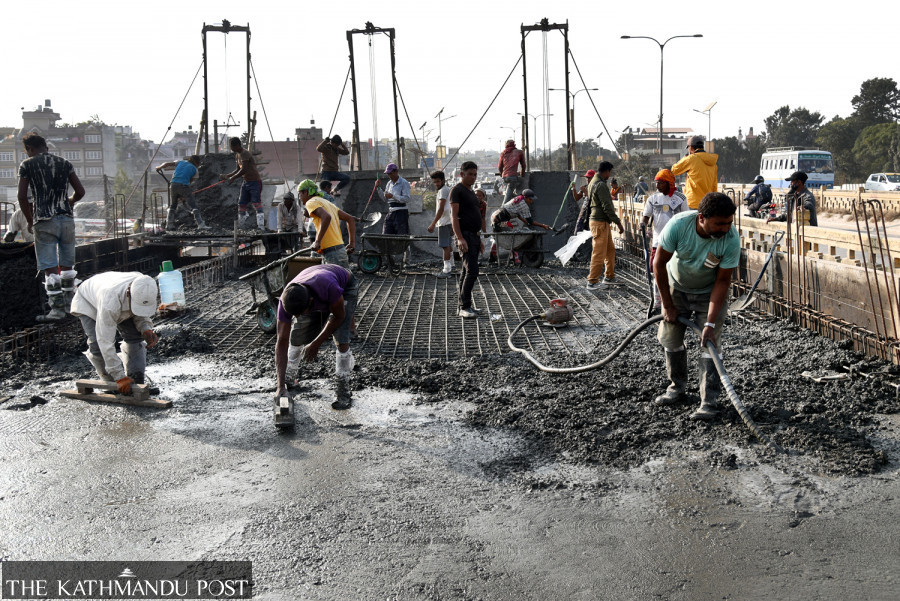National
Raised entry barriers for foreign contractors may limit competition
Officials and some contractors say priority given to domestic contractors would help save forex reserves.
Prithvi Man Shrestha
The government’s entry barriers to foreign contractors to participate in construction works valued below Rs5 billion could result in limited competition despite intending to help domestic companies to grow, stakeholders say.
Foreign companies cannot participate in bids for construction works valued below Rs5 billion as per the 12th amendment to the Public Procurement Regulation which was published in Nepal Gazette on Monday.
It is the second time in just over three months that the government raised the threshold barring foreign companies from bidding for works valued below the threshold.
In March this year, the government hiked such a threshold to Rs3 billion from Rs1 billion.
“The main objective of putting higher entry barriers for foreign construction companies is to prioritise domestic companies amid increasing capacity of domestic companies,” said Umesh Dhungana, spokesperson for the Public Procurement Monitoring Office.
Through the 11th amendment to the regulation, the government has provisioned that foreign construction firms can only bid for works valued between Rs5 billion and Rs10 billion through joint ventures with Nepali companies.
“Another objective of raising the bar for entry of foreign firms is to discourage outflow of foreign currency from Nepal,” said Dhungana.
Amid surging imports, Nepal is facing continued depletion of foreign currency reserves since the beginning of current fiscal year 2021-22.
According to Nepal Rastra Bank, the gross foreign exchange reserves of the country decreased by 21.1 percent to $9.28 billion in mid-May 2022 from $11.75 billion in mid-July 2021.
Dhungana, however, said that the entry barrier for foreign companies was raised not due to the current state of foreign exchange reserves. “It is just a coincidence that the entry barrier has been raised when the country is facing a decrease in foreign exchange reserves,” he said.
Some contractors, however, have questioned how the capacity of Nepali contractors increased overnight so that entry barriers for foreign contractors had to be increased substantially.
Until late March, the threshold was Rs1 billion, which was hiked to Rs3 billion in late March and it went up to Rs5 billion in less than four months.
“The policy was changed in the interest of some big contractors,” said Bishnu Bhai Shrestha, chairperson of CM Construction. “There are less than a dozen companies which can handle the construction works valued at around Rs5 billion solely.”
He said that the Federation of Contractors’ Associations of Nepal (FCAN) had not demanded that threshold for entry of foreign contractors should be raised to Rs5 billion.
Rabi Singh, president of FCAN, said that the federation has suggested keeping the threshold at maximum Rs3.5 billion.
“Because of the raised bar for the entry of foreign companies, there is the possibility of a cartel among big domestic contractors as there are not many large contractors who can work in projects valued around Rs5 billion single handedly,” he said.
A senior government official at the Public Procurement Monitoring Office admitted that the government heard the demand of the contractors to increase the threshold as they lobbied hard saying that they have already become capable of working up to Rs5 billion. “As they work in the field, the government listened to them,” the official said.
In fact, the PPMO had proposed to increase the threshold to Rs2 billion when it was increased to Rs3 billion in March, as per the draft of amendment obtained by the the Post.
The threshold was increased to Rs1 billion from Rs600 million by the fourth amendment to the public procurement regulation in 2016. Since the increase, the trend of collusion thrived, according to officials at the PPMO.
On May 13, 2019, the government had increased the threshold to Rs2 billion through the sixth amendment to the public procurement regulation. The threshold was later reduced to Rs1 billion again through the eighth amendment to the regulation on August 1, 2019.
The PPMO has been pointing out the incidents of possible collusion among the large contractors in its past annual reports.
In its annual report 2017-18, the procurement monitoring office mentioned possible collusion in the tender for developing Block A of the garment processing zone at Simara between the government agency and the contractors to block foreign builders.
When the consultant prepared the detailed project design, the estimated cost of the package was Rs1.17 billion. But when tenders were called, the estimated cost was reduced to less than Rs1 billion.
Four bidders passed technical qualification to undertake the construction of roads, drainage, sewerage and land work but there were no massive differences in prices quoted by all four bidders against the estimated cost of Rs849.99 million.
A PPMO report titled ‘A Collection of Reports on Public Procurement Monitoring and Complaints’ released in 2018 had also pointed out possible collusion among bidders while participating in and bagging contracts for road and bridge projects in the under-construction Dharan-Chatara-Gaighat-Katari-Sindhuli road and the Galchhi-Trishuli-Mailung-Syabrubesi-Rasuwagadhi road.
Singh, however, said that the new provision that a contractor who had already held a maximum five contracts, cannot participate in new bids, could pave the way for more other contractors to participate in the bids.
The big companies supported the government’s move on entry barriers for foreign companies as there are already many contractors that are capable of carrying out large-scale construction.
“There are already 50-60 companies which can solely handle construction projects valued at Rs5 billion,” said Sahadev Khadka, managing director of Bhimeshwor Drilling Tatha Nirman Sewa.
The contractors have different claims about how many companies have capacity to handle projects valued around Rs5 billion. On concerns over limitation in competition, he claimed that there would be enough competition among domestic companies.
“There is a provision in amended regulation that a contractor can bid for works valued Rs1 billion by submitting the experience of working in works valued Rs600 million which will allow entry of more bidders,” said Khadka.
In the past, a contractor should have presented the evidence of working in works valued at Rs800 million to participate in bids for works valued worth Rs1 billion.
“Nepali contractors have done better jobs than foreign contractors, evident from many projects where foreign firms have failed to continue work,” Khadka said. “Priority given to domestic contractors will also help keep foreign currencies within the country.”
The government offices have many bitter experiences of involving foreign firms in large infrastructure projects.
Major projects like Melamchi Drinking Water Project, Butwal-Narayagadh Road, Expansion of the Tribhuvan International Airport, Chilime Hydropower Project and Upper Trishuli A Hydropower Project were delayed where foreign firms were awarded contracts.
For Shivahari Sapokta, former director general of Department of Roads, domestic contractors should be prioritised despite the possibility of limited competition. “Foreign contractors don’t work even when a small problem arises, “ he said. “Domestic contractors run behind policymakers to clear the hurdles.”
But limited competition could increase the cost for the government. “As long as prices quoted by the domestic contractors are lower than the estimated cost, it should not be considered as costly to the government,” Sapkota said.




 8.4°C Kathmandu
8.4°C Kathmandu














